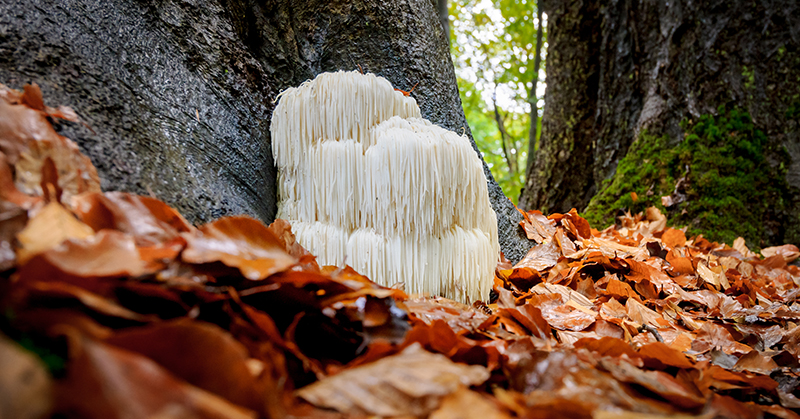Some call it monkeyhead. Others refer to it as tree hedgehog or bearded tooth. Yes, the names are unusual, but no matter what you call it, for eons this mushroom has been enhancing people’s lives.
From the ice age to current times, mushrooms like this one have served as both a food source –and medicine – for countless civilizations.
Now, it looks like this particular type of mushroom that we’ve been writing about for years really can help you stay sharp as a tack well into your golden years.
In fact, a new study shows that monkeyhead can even help the growth of brain cells!
This monkey head mushroom, better known in the United States as the lion’s mane mushroom (Hericium erinaceum), got its unique monikers due to its strange pompom-like appearance.
This mushroom has been used in Traditional Chinese Medicine to support overall health for centuries. It is believed to nourish five internal organs: the liver, heart, lungs, kidney, and spleen. Benefits that very few herbs can claim. In Traditional Chinese Medicine lion’s mane is so healthy that it’s known as the “ultimate tonic.”
Now scientists can add another amazing health benefit: these mushrooms magnify memory.
Lion’s mane DOUBLES brain cell growth
For the new research project, published in the Journal of Neurochemistry, researchers lab-tested a compound called NDPIH from lion’s mane on neurons from the hippocampus area of the brain. They were interested in this particular brain region because it’s responsible for memory and learning.
And what they found was incredible!
Exposing brain cells to NDPIH made them DOUBLE in growth compared to untreated cells.
Even better? The neurons grew stronger and formed more connections– the very connections used for enhancing memory.
Improved memory function in laboratory tests
Next, they gave NDPIH to mice and tested their memory in a maze.
The results showed that treatment with the active compounds in the mushroom improved the animal’s recognition memory.
Lion’s mane mushrooms have multiple brain benefits
As we’ve long been saying, other animal research has shown that the active ingredients in lion’s mane have multiple benefits for the brain. These include:
- Preventing brain cells breaking down and dying with age
- Protecting against cognitive decline caused by amyloid beta, the plaque that builds up in Alzheimer’s
- Promoting brain cell growth following injury
- Enhancing the production of myelin, the sheath that protects the nerves and is required for healthy mental function
- Improving memory and other cognitive abilities
When you combine these results, it shows that lion’s mane mushrooms may be able to stop, treat, or even repair the effects of brain damage and aging. Of course, these laboratory tests only measured neuron growth in animals, but there are results of human clinical and pre-clinical testing on lion’s mane extract, too.
Improves mild cognitive impairment
One double-blind, placebo-controlled trial on lion’s mane mushroom found that men and women over age 50 with mild cognitive impairment (MCI)– often a precursor to Alzheimer’s disease—experienced amazing changes in memory after taking supplements of lion’s mane extract. Specifically, they significantly increased cognitive function. In addition, they scored higher on all memory and thinking tests.
Another study of brain function found that measures of independence such as walking, eating, and dressing improved in all seven dementia patients taking the supplement. Six out of seven saw improvement in memory, understanding and communication abilities.
And another study of 30 postmenopausal women found those taking lion’s mane extract were less anxious and depressed, experienced improved concentration, and felt better about life. The improvements were only seen in the lion’s mane group and not in the placebo-controlled group.
How to use lion’s mane to improve memory and cognitive function
Lion’s mane mushroom is one of the most well-researched herbs available.
In addition to improved memory and well-being, there are numerous laboratory studies that show the bioactive compounds in lion’s mane may also help improve blood sugar, strengthen digestive health, improve your heart health, boost your immune system and even ward off cancer.
If you’d like to add lion’s mane to your daily regimen, you can find it fresh at certain specialty grocers. Of course, your best bet is to take a supplement.
You can find lion’s mane in capsule or powder form, it’s also available as a coffee or hot cocoa supplement. A commonly studied dose in the research we’ve seen is anywhere from three capsules to nine capsules daily.
Best Regards,
The Awakening From Alzheimer’s Team
https://www.ncbi.nlm.nih.gov/pmc/articles/PMC4684114/
https://onlinelibrary.wiley.com/doi/10.1111/jnc.15767
https://pubmed.ncbi.nlm.nih.gov/21383512/
https://pubmed.ncbi.nlm.nih.gov/21941586/
https://pubmed.ncbi.nlm.nih.gov/12675022/







